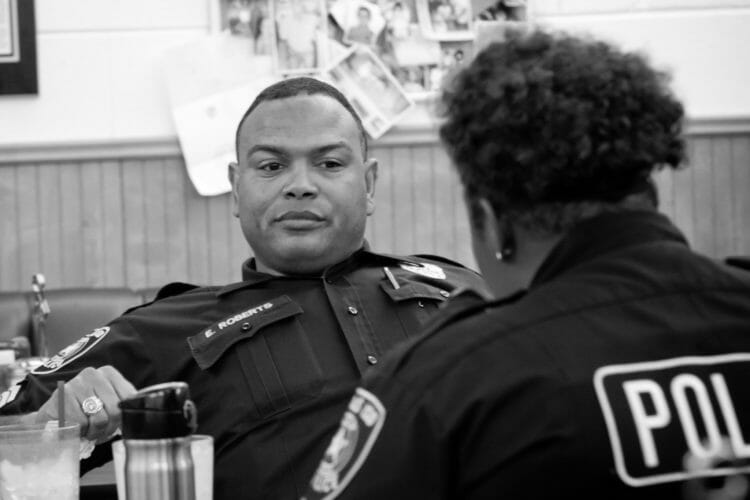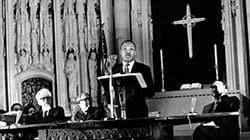Hope, healing during the ‘worst of times’

By The Rev. Dr. Marvin A. McMickle
“It was the worst of times.” This partial reference from the novel “A Tale of Two Cities” by Charles Dickens frames my thoughts and prayers today. It was the worst of times in Dallas, Texas, when a black gunman who was determined to “kill white people” unleashed a hail of bullets that resulted in the death of five police officers and the wounding of seven more.
It is unpardonable and unimaginable that someone who stated that he was somehow fueled and driven by the issue of “Black Lives Matter” would think that the best way to respond to the rampant cycle of shootings of black males by white police officers is to simply reverse the equation, having black men target and shoot white police officers.
As Mohandas Gandhi observed decades ago in defense of nonviolence, “If we practice an eye for an eye and a tooth for a tooth, soon the whole world will be blind and toothless.” As bad as the gun epidemic is in America, we are not going to shoot and kill our way out of this problem.
That being said, one cannot disassociate the events in Dallas from the shootings earlier that week in Louisiana and Minnesota, where equally innocent black persons were shot to death by police officers—events that would have gone unreported or, perhaps, differently reported were it not for mobile phone videos and “Facebook Live” postings.
It was amazing how quickly the nation’s attention was turned away from the killing of those two black men as all eyes turned to the fallen police officers in Dallas. Black lives matter no less than the lives of the men and women “in blue.” Those two black men join the list of 430 persons, as of July 30, 2016, who have been shot and killed in this country by police officers. “It was the worst of times” in many other cities in the United States where people feel less safe—often feeling less safe about their encounters with the police.
My own 36-year-old son who lives in New York City recently wrote on his Facebook page that he fears being “executed” by the police of that city because, at any given moment, he might become “guilty of the crime of his color.” His mother has urged him—a lifelong athlete—to stop jogging through the nearby park so that he not be imagined by authorities to be running from a crime scene. My brother who lives in Chicago observed that, in that city, black men are regularly confronted by police for nothing more than “BWB” (“breathing while black”).
The events of the last weeks and months in the United States cannot and should not be viewed in isolation from one another. They are part of a tortured history that dates back for decades, if not centuries. As Eddie Glaude Jr. has argued in his book “Democracy in Black: How Race Still Enslaves the American Soul” (Crown Publishing Group, 2016), some people’s lives matter more (or less) than others. Prominent people stood in line to voice their outrage over the death of the five police officers in Dallas. The vast majority of those same people had said or done nothing about the shooting of black men in Baton Rouge, Chicago, Cleveland, North Charleston, New York City and Charlotte as well as the deaths of other black individuals in police custody in cities all across the country.
Even within the Black Lives Matter movement itself there seems not to be an equal valuation of all lives. It is not widely known that the Black Lives Matter movement found its beginnings in the string of murders involving black transgender women. Most people in the United States seem to be much less anxious to stand up and speak out in defense of LGBTQ rights—an issue inseparably connected to the claim that “all” Black Lives Matter.
While I thoroughly affirm the premise of Black Lives Matter, I remain concerned about the fact that most black people who die as a result of gun violence do not die as a result of an encounter with a police officer. They die at the hands of another black person. Many black activists dismiss black-on-black crime or inter-communal violence as a false construct that obscures what is for them the larger issue—the abuse of police power. That may be a winning argument in a public rally, but it rings hollow when standing—as I have done far too many times—at the graveside of a child caught in the crossfire of gang violence.
The events in Dallas, followed by the shooting of police officers in several other cities, has undoubtedly made matters worse in terms of police-community relations. Police officers may be more suspicious when approaching a black suspect. Many black people are already suspicious— even paranoid—when being stopped and approached by the police. Black parents continue to drill into their children how they should act and what they should and should not say during an encounter with any law enforcement officer. Having “the talk” with their children about the potential dangers of engaging with the police may be hard for white parents to comprehend since many white people easily assume that police are present to keep them safe.
It is one of the worst times in America, but it is also the right time for people of faith in the message and example of Jesus Christ to stand up and speak out concerning the values that we hold dear. The way out of this valley of the shadow of death will only be found when all of us realize that all black lives and, indeed, all lives really do matter.
Galatians 3:28 says, “There is no longer Jew or Greek, there is no longer slave or free, there is no longer male and female; for all of you are one in Christ Jesus.” That principle should not only inform us as we figure out how to relate to one another inside the church community but should also be the standard by which we operate outside the walls of our church, spreading the truth of the gospel in this increasingly diverse country and world.
As a person of deep and unshakable faith in God, I cling to an old gospel song’s lyrics: “If we ever needed the Lord before, we sure do need Him now.” I invite and encourage all Christians to stand on the promises and the power of God!
The Rev. Dr. Marvin A. McMickle is president of Colgate Rochester (N.Y.) Crozer Divinity School.
Photo credit: Thomas Hawk
Previous Story | Story 2 of 16 | Next Story
— The Christian Citizen —


